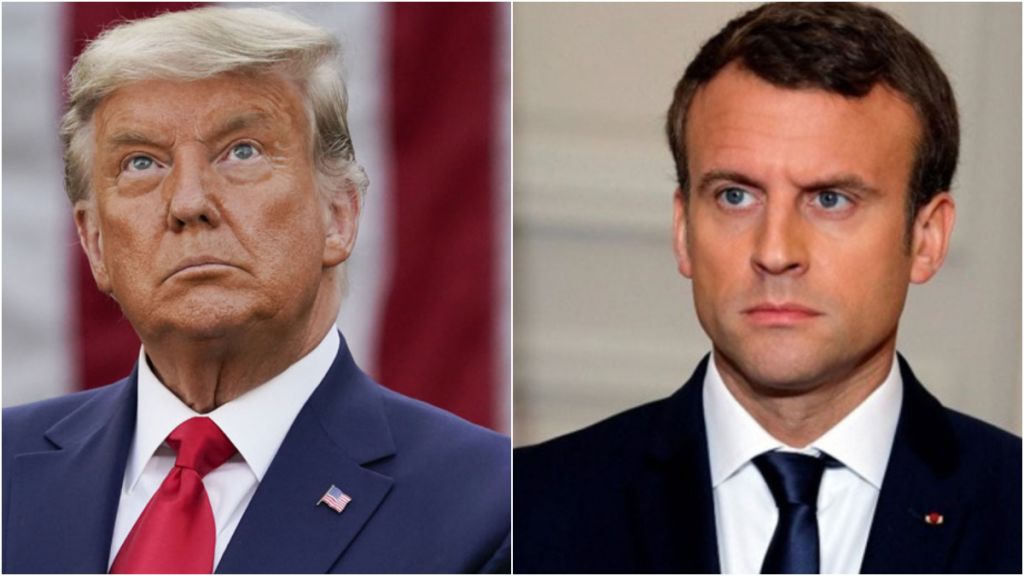
Paris: As Donald Trump returns to the White House following his inauguration in Washington DC on Monday, 20 January the dynamics between him and French President Emmanuel Macron remain uncertain. Macron, who was among the first global leaders to acknowledge Trump’s victory in November, appears cautious about aligning with the new administration. The nature of their future interactions is yet to be determined, leaving observers to speculate on the potential for a roller coaster of diplomatic exchanges.
In a speech to his ambassadors at the start of January, French President Emmanuel Macron emphasized the importance of maintaining strength and cooperation with the United States under President Donald Trump. Macron had said, “If we decide to be weak and defeatist, there is little chance of being respected by President Trump’s United States of America,” while acknowledging that Trump was however aware that France is a “solid ally” of the USA.
Despite this rhetoric, Macron opted to send Laurent Bili, the French Ambassador to the United States for Trump’s investiture ceremony instead of gracing the occasion himself, very much unlike his counterparts Italian Prime Minister Giorgia Meloni and Hungarian Prime Minister Viktor Orban, who attended the inauguration in person.
French diplomacy is currently reassessing its strategy towards Trump, who is reportedly more prepared than during his 2016 campaign. He now has an ideology which he will convert into action. During Trump’s first tenure Macron had attempted to engage him with a state visit to France, which included a dinner at the top of the Eiffel Tower, following a visit to Mount Vernon, the residence of George Washington. However, these efforts did not significantly alter U.S. policy, particularly regarding the conflict in Syria.
Macron faces the challenge of addressing several pressing issues with Trump, including potential increases in customs duties on European products by 10 to 20%. This measure could severely impact French industries, such as fashion, perfumes, wines, and spirits, with wine exports to the United States alone contributing 2.1 billion euros to France’s trade balance.
Trump is more a businessman than a politician. It is therefore no surprise that real estate mogul Charles Kushner has been appointed as the U.S. ambassador to France, marking a significant appointment in the Trump administration’s foreign policy team and sending out Trump’s message that he wants the American super-rich bourgeoisie to occupy key spots in his government.
Another hot topic: In terms of defense, Trump wants NATO members to increase their budgets, currently around 2% of GDP, to around 5% This would imply that France would have to increase its military budget twofold from 50 billion euros to around 100 billion euros. Finding a middle ground with the American leader on this subject will be mission impossible.
Just a few days after the results of the American elections last November, Macron present in Budapest alongside the Secretary General of NATO had declared, "For me, it's simple. The world is made of herbivores and carnivores. If we decide to remain herbivores, the carnivores will win and we will be a market for them," the French president had then declared.
But tensions seemed to have eased a notch when Notre Dame Cathedral reopened last December, with Donald Trump choosing Paris for his first international trip since his re-election. The rendezvous between the two heads of state at the Notre Dame made heads turn: Were they going to be friends again?
The cathedral’s re-inauguration facilitated a tripartite meeting between Ukrainian President Volodymyr Zelensky, Macron and Trump on seeking an agreement with Russia to end the war in Ukraine. This gives Macron who is in political turmoil on the home front, a crucial position on the international front, that of a negotiator in the conflict between Kiev and Moscow and to try to play the arm wrestling match between the European Union and the United States.
Brussels is not in a position of strength with a Franco-German couple, historically the driving force of Europe, at a political standstill for months. Donald Trump could choose to rely on Italy and Poland, which currently holds the rotating presidency of the EU, to push his advantage.
Unlike his first presidency, the American president also arrives at the White House with friends from outside his country's borders, from those already elected like Viktor Orban to British MP Nigel Farage and AFD chief Alice Weidel in Germany.
It is in this complicated context that the European Union might want to present ‘businessman’ Donald Trump with an attractive ‘shopping list’ in order to calm tensions. For instance, the purchase of arms in Washington if customs surcharge is not applied, contracts on liquefied natural gas , markets reserved for American companies for the reconstruction of Ukraine could be added to the ‘shopping list.’
A few hours before Donald Trump's inauguration, newly elected French Prime Minister, François Bayrou said that France and the European Union would be “crushed, dominated and marginalized” by Trump's policies if they did nothing to unitedly stand up to the American leader.